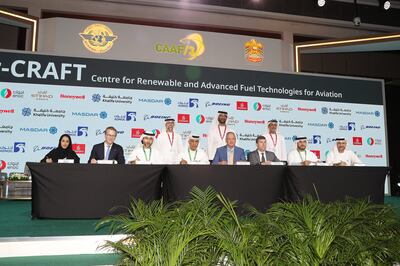Fossil fuel producers need to play a bigger role in boosting the production of sustainable aviation fuels (SAF), which are key to the aviation industry’s net-zero efforts, the UAE's Minister of Energy and Infrastructure has said.
Accelerating the adoption of SAF and the creation of a market for the low-carbon fuel would require support from fossil fuel companies, Suhail Al Mazrouei said during a panel session at the third conference on Aviation Alternative Fuels in Dubai on Monday.
“We need to transition, and we need to transition quickly, but to transition, you need to create the market [and] to create the market, you need to start from those who are producing the fuel of today,” Mr Al Mazrouei said.
“They [energy companies] are willing to help the aviation sector to transition. It's obvious that some of those you see them today and I'm sure others will follow.”
SAF, alternative fuel made from renewable sources that can be used to power aircraft, is crucial for the global aviation industry to reach its net-zero goals by 2050. The aviation sector is responsible for about 2 per cent of global CO2 emissions.
The UAE, which aims to achieve net-zero emissions by 2050, is engaging with oil and gas producers to produce more SAF, Mr Al Mazrouei said. He added that significant investments would be required along with more private sector participation.
Participants in the panel also called for a more inclusive transition to SAF, given economic differences between regions.
“Our goal is not to reduce flying, but our goal is to reduce carbon emissions,” said Chee Tat, Singapore’s acting Minister for Transport.
“[Asia] is a region where we still have strong economic growth potential. We still have many millions of people who may not have [had] a chance to travel yet … so, it is important that we do not deny them the benefits of travel.”
It is also important to set quantifiable goals for the reduction of carbon emissions to send a “clear” signal to fuel producers and financial institutions, he added.
Investors want a “quantified outcome” to ensure the durability of their investments, added Annie Petsonk, US assistant secretary for aviation and international affairs.
“If they're going to make major investments to allow sustainable aviation fuel to be produced in refineries to develop feedstocks and supply chains, they want to be sure that governments are serious about this transition,” Ms Petsonk said at the event on Monday.
SAF is expected to contribute to about 65 per cent of the reduction in emissions needed by aviation to reach net zero in 2050, according to the International Air Transport Association.
However, SAF currently comprises less than 1 per cent of all jet fuel used globally.
Mr Al Mazrouei said that the aviation industry also needed to consider the price of alternative fuels to protect consumers.
“We need to be mindful of the transition speed and the impact on the consumers,” he said.
“At the end of the day, it's going to be the consumers who are going to decide if the price of the alternative is something that they can afford.”
Last year, the average SAF price estimate was about $2,400 per tonne, about two and half times higher than the price of jet fuel, according to Iata.
UAE launches SAF research initiative
The UAE on Monday launched a research consortium that will focus on developing, producing and advancing SAF technologies.

The consortium is made up of eight entities that include Adnoc, Boeing, Emirates, Enoc Group, Etihad Airways, Honeywell, Khalifa University and Abu Dhabi’s clean energy company Masdar.
The UAE Centre for Renewable and Advanced Fuel Technologies for Aviation – called Air-Craft for short – will bring together industrial policymakers, aviation regulators, fuel producers, academics, researchers, plane makers, power plant manufacturers and airlines.
The new initiative was announced at the sidelines of the event, with less than two weeks to go before the Cop28 climate conference in Dubai.






